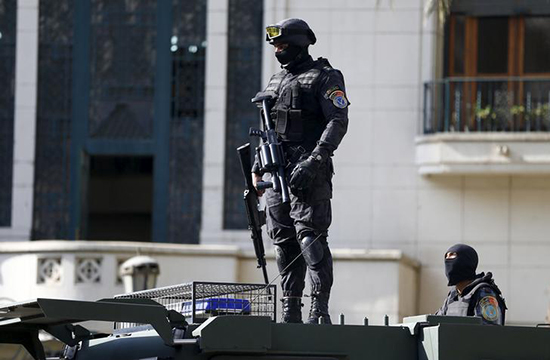New York, April 15, 2016 — Egyptian police should cease harassing journalists and ensure they can do their jobs safely, including at demonstrations, the Committee to Protect Journalists said today.
At least two journalists were injured covering demonstrations in the capital, and at least eight journalists were harassed and briefly detained covering demonstrations across the country today, according to press reports and the Egyptian human rights group Journalists Against Torture Observatory (JATO). Thousands gathered in central Cairo and in the Mediterranean city of Alexandria to protest an agreement to hand control of two Red Sea islands to Saudi Arabia announced during Saudi King Salman’s five-day visit to Cairo last week.
“The Egyptian government has a duty to ensure the safety of journalists in all circumstances,” CPJ Middle East and North Africa Program Coordinator Sherif Mansour said from Washington. “We call on the highest authorities in Egypt to send a clear signal that journalists must not be harmed or harassed as they cover protests.”
Mustafa Mohamed, a journalist for the daily newspaper Al-Watan, and Ali Faheem, a photographer for the daily newspaper Al-Fagr, were shot by rubber-coated bullets while covering a protest moving from the Istiqama Mosque in Giza across the river to central Cairo’s Tahrir Square, according to news reports and JATO. Mohamed was shot in the stomach when he took his camera out of a bag to begin taking pictures, his wife told JATO. He was taken to a nearby hospital where he was treated for light injuries. Faheem was hit and lightly injured in the foot by a rubber-coated bullet, according to JATO.
Ahmed Baraa, a reporter for the daily newspaper Al-Youm Al-Saba’a, told JATO that police at the same protest held him in a police truck with 10 other demonstrators for roughly an hour, before releasing him without charge. Police also briefly detained Bakr Sharkawi, a correspondent for the ONA news agency, and tried to break his camera, he told JATO. Tariq Wagih, a photographer with Al-Masry Al-Youm, and Al-Watan editor Hassan Noaman were briefly detained in the area, according to news reports and JATO.
Police detained Sayed Al-Ebidi, a photographer for daily Al-Wafd newspaper, for an hour at a protest in northern Cairo’s Rabaa al-Adaweya Square, according to his outlet and JATO. The square was the site of a large sit-in police dispersed with lethal force in August 2013. Police released Al-Ebidi after examining his personal account on the social media website Facebook and after he agreed to delete photographs he had taken at the protest.
Police detained three journalists — Hussein Fouad, a photographer for Al-Masry Al-Youm; Rania Helmy, a reporter for the news website Masr Al-Arabia; and Mostafa Hassan, a reporter for the newspaper Rosa al–Youssef — from a café near the site of protests in Alexandria, according to news reports. Helmy told JATO that police accused the three of working Qatari broadcaster Al-Jazeera, but let them go after deleting the photographs on her camera. Al-Jazeera has been a fierce critic of the current Egyptian administration.
In Port Said, where the Suez Canal meets the Mediterranean, a senior officer at the Al-Arab police station threatened to charge journalists who wanted to cover protests with subversion and sedition and pushed Al-Masry Al-Youm photographer Mohamed Rashed, causing him to fall to the ground, according to news reports and Al-Watan photographer Mohamed Kamal’s witness testimony to JATO.
Press accounts estimated the crowds at today’s protests in Alexandria as the largest Egypt has seen since 2013. According to news reports, at the end of a Wednesday speech defending the deal on the Red Sea islands, Egyptian President Abdel-Fattah al-Sisi cut off a member of parliament who had tried to ask him a question, saying, “I did not give anyone permission to speak,” and state television abruptly cut its live broadcast.
